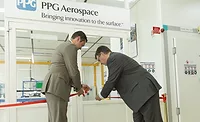Clariant Inaugurates Pilot Plant for Cellulose Ethanol
MUTTENZ, Switzerland - Clariant, the Swiss specialty chemicals company, inaugurated Germany's biggest pilot plant for the production of climate-friendly cellulose ethanol from agricultural waste. Located in Straubing, Bavaria, and supported by the Bavarian government and the Federal Ministry for Education and Research, the futuristic project will produce up to 1,000 tonnes of cellulose ethanol from around 4,500 tonnes of wheat straw based on the sunliquid® technology developed by Clariant. It represents an investment of around EUR 28 million. Studies show that Germany potentially has around 22 million tonnes of straw that could be used for energy production without compromising essential soil regeneration. This would be sufficient to cover around 25 percent of Germany’s current gasoline requirements.
The plant at the Bavarian BioCampus in Straubing is logistically located right next to the Donau harbor and will procure its raw materials largely from the Straubing region.
Professor Andre Koltermann, Head of Clariant's Biotech & Renewables Center, said, "We have been developing the sunliquid technology since 2006 and have been testing the method on a pilot scale since 2009." In an area encompassing approximately 2,500 square meters, all the process steps will be performed that will later be used in an industrial-scale plant, with the aim of confirming the technological feasibility of the sunliquid technique. "The results we obtain in Straubing will enable us to plan industrial production plants efficiently and economically, and ultimately to realize such plants in cooperation with partners," continued Koltermann.
The sunliquid process is an innovative biotechnological method that turns plant waste products such as grain straw and corn straw into second-generation cellulose ethanol.
Looking for a reprint of this article?
From high-res PDFs to custom plaques, order your copy today!




